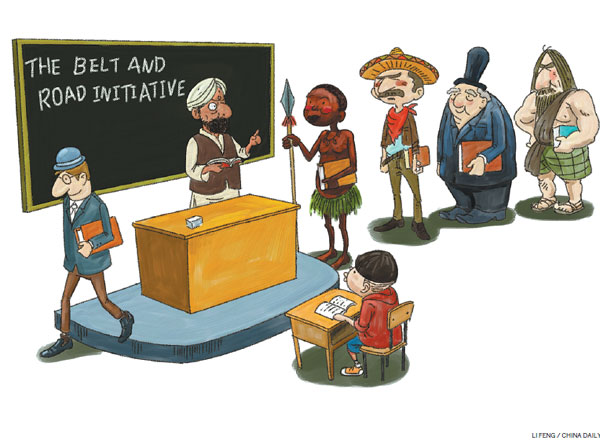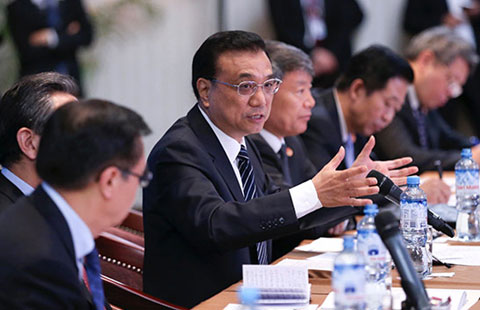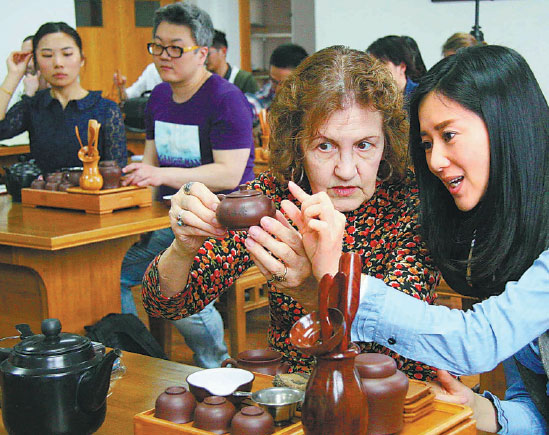Initiative spurs language learning
Updated: 2015-05-25 07:27
By Luo Wangshu(China Daily)
|
||||||||
Less commonly taught tongues are needed as trade increases in Asia and Europe
To ensure sufficient skilled workers for China's Belt and Road Initiative, universities have been adding foreign language programs to cultivate interdisciplinary talent.
Beijing Foreign Studies University has made establishing more programs for languages one of the top objectives of its long-term plan.
University President Peng Long said that BFSU will open three more foreign language programs by 2020, bringing its total to 70.
Xu Liping, a senior researcher in Southeast Asian affairs at the Chinese Academy of Social Sciences, has experienced the urgent need to nurture talent with less commonly taught language skills.
"Chinese leaders, integrating domestic and overseas resources, designed the Belt and Road Initiative to cater to the trend of economic globalization, cultural diversity and the information era. The initiative has a higher requirement for talent, especially interdisciplinary talent," Xu said.
President Xi Jinping launched the initiative, Silk Road Economic Belt and 21st Century Maritime Silk Road, in 2013 to link Asia and Europe through development, trade and culture.
Wang Huiyao, president of the Center of China and Globalization, a Beijing-based think tank, said that one of the challenges to implement the initiative is the talent shortage.
"The initiative is China's new globalization," Wang said. "China has benefited from globalization. The country's GDP has increased six to seven times since entering the World Trade Organization."
Jia Wenjian, vice-president of BFSU, said the university sees the improvement of less commonly taught language programs as a pivot. "With appropriate support from the government and academia, we will witness the blossoming of less commonly taught languages," Jia said.
Liu Shuxiong, a professor in Southern Asian studies at the School of Foreign Languages at Peking University, said most of the countries and regions along the areas of the Belt and Road Initiative are developing economies, from Eastern Europe to Southeast Asia.
"More than 60 countries have expressed interest in the initiative. China has already signed memorandums with a few of them. More than half of people in the world have or will participate in the initiative. As a community for less commonly taught languages, we are obligated to be prepared for the big event on the international stage," Liu said.
Li Yonghui, dean of the School of International Relations and Diplomacy at BFSU, said the development of less commonly taught languages has "always bonded" with China's political and diplomatic development.
"China, as a rising country, has an urgent and massive need for talent in less commonly used languages," Li said. "However, maybe because it is growing quickly, the preparation of talent could not keep pace with development."
The Belt and Road Initiative promotes common development and prosperity.
According to the action plan issued in March, the initiative "runs through the continents of Asia, Europe and Africa, connecting the vibrant East Asia economic circle at one end and developed European economic circle at the other, and encompassing countries with huge potential for economic development".
The Asian Infrastructure Investment Bank, which provides financial infrastructure for the initiative, was founded this year with the participation of 57 countries.
Three types of talent are in particular need for the initiative, said Xu, from the academy.
"The first type is those with language skills. ... The initiative covers three to four continents, including more than 60 countries. It requires communication and negotiation with countries along the Belt and Road Initiative. Talent with foreign language skills are in widespread need. ... Many enterprises told me that they need graduates from less commonly taught language programs and they are willing to pay them a decent salary," he said.
"The initiative involves projects in various fields, including finance, mechanics, fundamental facility construction and science cooperation. ... The future cooperation is in all fields, requiring talent from each field," Xu said, adding that he participated in satellite imaging cooperation in Southeast Asia in the Chinese Academy of Sciences.
Getting ready
BFSU is one of the first group of universities to take action. Its School of Asian and African Studies launched programs in the spring semester in Mongolian, Tamil, Bengalese and Filipino.
BFSU's new programs - 29 in Mongolian, 30 in Tamil, 22 in Bengalese, 24 in Filipino - are nondegree programs.
These languages - predominately used in Mongolia, Sri Lanka, Bangladesh, India and the Philippines - are all found along the regions of the Belt and Road Initiative.
"Since the new programs started, BFSU now covers all languages in ASEAN countries," said Sun Xiaomeng, dean of the School of Asian and African Studies, adding that the university is working toward offering degree programs in Mongolian and Filipino.
The School of Asian and African Studies, founded in 1961, provides 23 language programs; 16 degree programs and seven nondegree programs.
The curricula is carefully designed and has gone through thorough and repeated reviews by scholars, Sun said, adding that Mongolia is an important trading partner with China, but Chinese have less understanding of Mongolia than the other way around.
The university will gradually introduce another 11 less commonly taught languages, including Georgian, Armenian and Moldovan.
To nurture interdisciplinary talent, the school encourages students to take more than one language program.
"The ideal student should master at least one less commonly used language and one commonly used language ... we encourage them to learn a third and even fourth language," Sun said, adding that the school will provide similar optional language programs to expand students' choices.
"For instance, we are considering providing Tamil programs to students in a Sinhalese major. These two languages have high similarities, which should be easier for Sinhalese speakers to learn Tamil," Sun said.
In addition to providing more language programs, the university also encourages cross-major cooperation to nurture interdisciplinary talent.
Li, dean of the international relations school, and Niu Huayong, dean of the business school at BFSU, expressed willingness to cooperate with the School of Asian and African Studies.
"We could open curricula to all students, for instance, allowing students in international relations to learn a less commonly taught language and students from less commonly used language programs to learn international relations," Li said.
Beijing Language and Culture University will launch an English plus Turkish program in the fall, aiming to nurture students who can master those languages and also know French or Japanese as a third language.
Self-development considered
Experts are also calling for students' professional and self-development to be taken into consideration.
"Traditionally, the disadvantage of majoring in a less commonly used language is the restriction of the region. In other words, we, as professionals of a less commonly used language, would deal with this region for our whole lives," said Mi Liang, professor from the School of Asian and African Studies.
"However, if China has less or even no communication or connection with the country for decades for some reason, students of the language may face unemployment. ... The solution is to nurture interdisciplinary talent," Mi said.
Sun Xiaomeng, the school's dean, said, "We are not only providing certain programs solely to cater to the country's needs, but also consider students' development and interests."
Wu Shu, a sophomore at BFSU's International Business School, selected Mongolian this semester, and is studying the language to reconnect with her ancestry.
A student of Mongolian descent, Wu is not able to speak Mongolian because she was born and raised in a Han-dominant environment.
"It is a shame to be a Mongolian but not be able to speak the mother tongue," the 21-year-old said, adding that she cherished the opportunity at university and "could not wait to start".
Beyond academia
Wang from the Center of China and Globalization, said that think tanks also contribute to development.
"Globalization and international relations will always be a hot topic as China continues to go out," Wang said.
The center recently launched a Belt and Road Initiative Research Institute, conducting practical research and aiming to provide solutions to enterprises.
Regarding the talent shortage, Wang said it is important to nurture more understanding of China among foreign students.
"For instance, China should welcome and provide more assistance to foreign students from the countries along the Belt and Road Initiative, allowing them to study in China," Wang said.
luowangshu@chinadaily.com.cn


|
A visitor learns Chinese tea culture at the Tea Culture College of Zhejiang A&F University in Lin'an, Zhejiang province. Chen Shengwei / for China Daily |
(China Daily 05/25/2015 page6)
- Fourth generation of 'face-kini' soon to hit beach in Qingdao
- Tibetan town captures photos of their 'panda deity'
- 600 arrested in Beijing's vice crackdown
- Building collapse in Guizhou caused by landslide: govt
- Xi welcomes Japan delegation but warns against historical distortion
- Chinese Vice-Premier stresses flood control
- Ireland becomes first country to vote for equal marriage: PM
- Gov't declares high alert after landslide blocks Kali Gandaki River in Nepal
- Restorers give shape to Pompeii victims
- China, Russia end joint naval exercises
- Japanese visit underlines thaw in relations
- China, Brazil cooperation can ride 'winds and tides'

 Smiles win Friends from afar
Smiles win Friends from afar
 Premier talks with Chinese entrepreneurs in Peru
Premier talks with Chinese entrepreneurs in Peru
 Tourists enjoy themselves at Mingsha Hill desert
Tourists enjoy themselves at Mingsha Hill desert
 Colombia: A birdwatcher's paradise
Colombia: A birdwatcher's paradise
 Journey of a migrant girl from village to ad world
Journey of a migrant girl from village to ad world
 Photographer captures Chinese on the train
Photographer captures Chinese on the train
 Hou Hsiao-Hsien's The Assassin premieres in Cannes
Hou Hsiao-Hsien's The Assassin premieres in Cannes
 Top 10 highest-paid white-collar jobs in China
Top 10 highest-paid white-collar jobs in China
Most Viewed
Editor's Picks

|

|

|

|

|

|
Today's Top News
Chinese premier arrives in Chile for official visit
Expansion of free trade possible on Chile visit
Chilean president sees promising prospects for relations with China
Mathematician John Nash killed in car crash
Chinese premier encourages firms to upgrade cooperation with Peru
China, Peru agree on feasibility study on transoceanic railway
China manufactures first
car for US market
Wisconsin hopes to make cheeseheads in China
US Weekly

|

|







